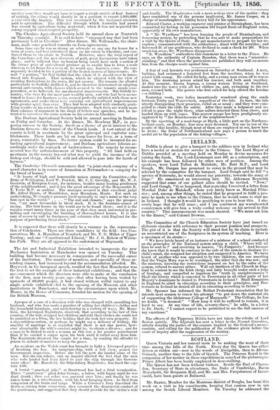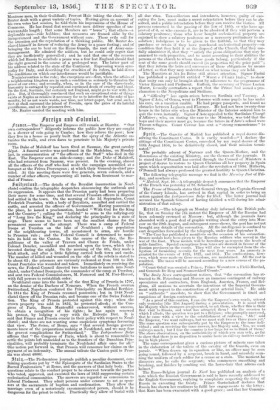SCOTLAND.
Queen Victoria and her consort seem to be making the most of their time among the hills of the North. Every day the Queen has either driven or ridden out—now to the woods of Abergeldie then to Alt-na- Guisach, another time to the falls of Quoich. The Princess Royal is the companion of her mother in these expeditions in search of the picturesque. Prince Albert has been busily employed in deer-stalking. The Queen has not been without visitors. Beside the Earl of Claren- don, Secretary of State in attendance the Duke of Cambridge, Baron Marochetti, Sir Benjamin Hall, and Mr. and Mrs. Farquharson of Inver- cauld, have been guests at Balmoral.
Mr. Baxter, Member for the Montrose district of Burghs, has been this week on a visit to his constituents, keeping that custom now in use among the Scotch Liberal Members. On Tuesday he addressed the Montrose men, in their Guildhall; Provost Hale taking the chair. Mr. Baxter dealt with a great variety of topics. Having given an account of his own votes last session, he told them his impressions of the House of Commons. He has found that second-rate men deliver speeches of un- warrantable length ; that some Members are " bores" ; that others—a deplorable race—ride hobbies ; that measures are framed alike by the inexperienced and the Government without care. These evils call for the attention and the reprobation of a thinking public. Mr. Baxter de- dared himself in favour of reducing the Army to a peace footing; and of bringing the axe to bear on the Horse Guards, the root of Army-mis- management. He admired the soldiers, but he could only regret that they are inefficiently generallcd ; and he said that one of the reasons which led Russia to conclude a peace was a fear lest England should find the right general in the course of a prolonged war. The latter part of his address related to the state of the Continent. Expressing warm sym- pathy for Italy, and describing the cruelties of its rulers, he laid down the conditions on which our interference would be justifiable.
Nonintervention is the rule ; the exceptions are—nrst, when the affairs of a neighbouring kingdom are in such a condition as seriously to threaten the peace of our own ; and secondly, when, as in the case of the slave-trade, humanity is outraged by repeated and continued deeds of cruelty and blood. On the first, Sardinia, but certainly not England, might go to war with Na- ples. But, if thoroughly convinced that such an exceptional state of things exists at Naples as renders it necessary for us to interfere for the sake of hu- manity, let us not waste words, nor time, nor letter-paper, but send such a fleet as shall surround the island of Procida, open the gates of its hateful- guardhouse, and set the prisoners free.
Mr. Baxter carried the meeting with him.



























 Previous page
Previous page